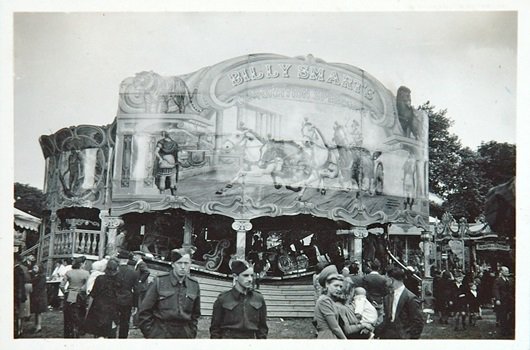
Fairground enthusiast Philip Bradley spent his life compiling a written and photographic record of every fair he visited resulting in over 30,000 images. When World War II started in September 1939, his notes give us a look at how the war affected fairgrounds and the lives of the showmen.
Bradley records that the invasion of Holland and Belgium by the Germans on 10 May caused the Whitsun Bank Holiday to be officially cancelled, but the fairs mostly opened as usual. Bradley himself enlisted in the Army on 17th July 1940, at Lincombe, near Ilfracombe, Devon, and being a dedicated enthusiast, he visited a fair on the quay at Ilfracombe the next day! After a few months he was made a Lance-Corporal and in his summary of 1940 states that most fairs were smaller than usual, and the Blitz had caused the complete destruction of some fairgrounds and rides. Bradley was discharged from the Army on medical grounds in February 1941. Back in ‘civvy street’, he notes that many of the surviving fairs were held in connection with campaigns such as 'War Weapons Week', 'Wings for Victory', and 'Dig for Victory'.
In 1941, Bradley reported that food, fuel, and prize problems were worse. Coconuts took up shipping space, and rifle ranges didn't have enough ammunition. Music was quieter so it wouldn't drown out air raid alerts, and many showmen's engines were used for demolition work in bombed cities like Merseyside, Manchester, and London. The stark reminder of hardship of Showmen and their families is recorded in one photograph taken by Bradley at Heston May Fair, in 1941. A blackboard notice reads: "The London Section Showman's Guild, owing to so many of our members serving in the forces or on work of national importance we are sorry that in the circumstances we are unable to provide the fair in the usual size. Trusting you will support our effort".
By 1943, Bradley noted that some fairs were held on bombed-out sites, while others were cancelled. Wanstead Flats fairground in Essex was used for a Prisoner of War Camp and later as a transit camp for troops preparing for the D-Day invasion. After June 1944, flying-bomb attacks caused almost all fairs in Greater London to be abandoned.
On May 8, 1945, Bradley wrote that the end of the European War was announced and celebrated as 'VE' Day. The 8th and 9th of May were holidays, and fairs started to open again. He noted that 'Victory in Europe' and 'final victory' in August led to many fairs being revived, but lighting was still limited due to government rules about decorative lighting.
You can read more about fairgrounds during wartime and the Philip Bradley Collection on Exploring Surrey's Past.
More from heritage news
- New additions to the archive in July
- Gypsy, Roma and Traveller History Month
- Surrey on film for VE Day
- Surrey Heritage
- Historic Gertrude Jekyll garden plans donated to Surrey History Centre
- Women’s History Month 2025
- LGBT+ History Month 2025
- Holocaust Memorial Day 2025
- It’s South Asian Heritage month
- Local and Community History Month
